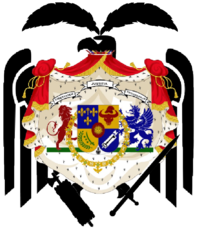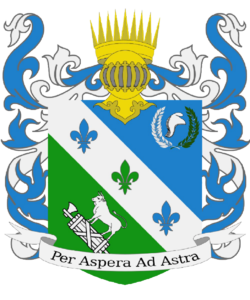National Assembly of Efransa
National Assembly of Efransa Assemble Nacionale od Elfransa | |
|---|---|
| First Parliament | |
 | |
| Type | |
| Type | Lower House of the Parliament |
| Leadership | |
Speaker | The Lord of Fencia, Social Democratic since April 27, 2020 |
| Structure | |
| Seats | 5 |
 | |
Political groups | Majority (5)
Minority (4)
|
| Committees | Finance Committee, Justice and Home Affairs Committee, Social Affairs (Chancellery) Committee, Committee of the Whole. |
Joint committees | Chamber of Deputies |
| Elections | |
| Single Transferable Vote (From Party-Lists) | |
| Appointment by the King (If needed under the Appointment Powers Act) | |
Last election | April 15, 2019 |
Next election | October 11, 2020 |
| Meeting place | |
| Legislative Table, Limone, Pormalia | |
The National Assembly of the Kingdom of Efransa (Efrasachin: Assemble Nacionale du Rouiame od Elfransa) is the lower house of the Parliament and one of two houses of the General Congress, the other being the Senate. The National Assembly consists of 5 Representatives elected every four months. The National Assembly convenes in the Assembly Hall at the Parliamentary Palace.
The National Assembly has slightly more legislative powers compared to the Senate. The Assembly approves the King’s nominee for Prime Minister, but in practice the King nominates the leader of the majority party.
History
The National Assembly has its roots in the House of Baronets of the County Palatine of Maradia, the lower house of the Grand Senate.
The modern National Assembly came into form as the National Assembly of the Kingdom of Floeratia, later, the National Assembly of the Kingdom of Efransa, the lower house of the General Court. It later became the Chamber of Deputies of the Kingdom of Efransa, of the Efrasachin Empire, and the Iblusigonian Empire, as the lower house of the Parliament (later Federal Parliament).
The Chamber of Deputies was dissolved along with the Empire following the September Revolution, and was replaced by the House of Representatives of Tribarcas, the lower chamber of Parliament, the other being the Senate. The House of Representatives lasted as long as the Republic, dissolving during the formation of the United Kingdom of Maradia and Fienomige.
The House of Representatives was once again the Chamber of Deputies during the Maradian period, but the National Assembly was the transitional unicameral legislature. The National Assembly continued as the permanent legislature of the Republic of Ludisirga, later becoming the Congress of the Union of Efransa, which had a Senate and a Chamber of Deputies.
The current National Assembly is a direct successor to the Union Chamber of Deputies.
Structure
The Speaker of the National Assembly is the presiding officer of regular sessions of the Assembly, and of Parliament as a whole. The Speaker is selected by the Assembly at the beginning of each new Assembly. The Assembly is divided into four Committees: Finance; Justice and Home Affairs; Social Affairs; and of the Whole. The Prime Minister presides over the Committee of the Whole.
The Finance Committee has responsibility for regulating the financial institutions of Efransa. The Justice and Home Affairs Committee is responsible for the Justice Department, the Ministry of Home Affairs, and the High Court of Justice. The Social Affairs Committee is responsible for the Chancellery
The Assembly has 5 Representatives elected every fourth month, the next election will be held on October 11, 2020, after the June 5 election was canceled by Royal Proclamation because of the 2019-20 Coronavirus pandemic. The two political parties in Efransa (Social Democrats and the People’s League) are the sole candidates in elections, other than independents. The current composition is 4-1 for the Social Democrats.
Powers of the Assembly
The National Assembly is slightly more powerful than the Senate. Both have the power to pass or deny passage to legislation, but the Assembly can override the Senate. The National Assembly also has the power to confirm, reject, or hold a vote of no confidence in the Cabinet. The National Assembly also elects and approves various officials, such as the State Prosecutor or the State Business Supervisor
The National Assembly also has more oversight over the Cabinet, overseeing all but the Ministry of Foreign Relations. The Assembly also may challenge the King’s decisions in questions of constitutionality, in the Administrative Chamber.
